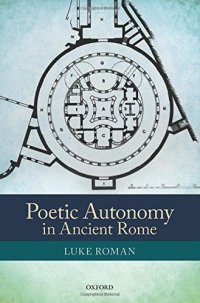
Ebook: Poetic Autonomy in Ancient Rome
Author: Luke Roman
- Tags: Latin poetry, History and criticism, Rhetoric, To 476, Poesía latina, Historia y crítica, Retórica, Edad antigua
- Year: 2014
- Publisher: OUP UK
- City: Oxford
- Edition: 1
- Language: English
- pdf
In Poetic Autonomy in Ancient Rome, Luke Roman offers a major new approach to the study of ancient Roman poetry. A key term in the modern interpretation of art and literature, "aesthetic autonomy" refers to the idea that the work of art belongs to a realm of its own, separate from ordinary activities and detached from quotidian interests. While scholars have often insisted that aesthetic autonomy is an exclusively modern concept and cannot be applied to other historical periods, the book argues that poets in ancient Rome employed a "rhetoric of autonomy" to define their position within Roman society and establish the distinctive value of their work.
This study of the Roman rhetoric of poetic autonomy includes an examination of poetic self-representation in first-person genres from the late republic to the early empire. Looking closely at the works of Lucilius, Catullus, Propertius, Horace, Virgil, Tibullus, Ovid, Statius, Martial, and Juvenal, Poetic Autonomy in Ancient Rome affords fresh insight into ancient literary texts and reinvigorates the dialogue between ancient and modern aesthetics.
This study of the Roman rhetoric of poetic autonomy includes an examination of poetic self-representation in first-person genres from the late republic to the early empire. Looking closely at the works of Lucilius, Catullus, Propertius, Horace, Virgil, Tibullus, Ovid, Statius, Martial, and Juvenal, Poetic Autonomy in Ancient Rome affords fresh insight into ancient literary texts and reinvigorates the dialogue between ancient and modern aesthetics.
Download the book Poetic Autonomy in Ancient Rome for free or read online
Continue reading on any device:

Last viewed books
Related books
{related-news}
Comments (0)